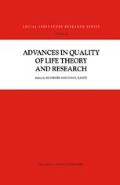Abstract
In a study of SWB among 948 Dutch long-term unemployed, the two main questions were (1) do long-term unemployed learn to adjust, i.e. does the negative effect on SWB wear off over unemployment duration?; and (2) does social participation help adjustment and restoration of SWB?
The effect of unemployment on SWB was negative, as expected, but was unrelated to unemployment duration. Neither income nor social participation explained variation in SWB to a substantive degree. Apparently, unemployment deprives people of an important source of well-being which is difficult to compensate.
The proposed explanation for these findings comes from Social Production Function theory (Lindenberg 1986, 1996). SPF-theory specifies an instrumental hierarchy of universal human goals. It provides a systematic tool to study the processes by which people realize these goals, given the restrictions and resources they face. We argue that SPF-theory, by giving insight in the process of substitution and the role therein of multifunctionality of production factors, allows more precise identification of determinants of SWB.
Notes
I would like to thank Ed Diener, Arie Glebbeeck, Siegwart Linderberg. Henk des Vos and two anonymous reveiewers for their helpful comments on a previous draft of this chapter, and Arjen Edzes and the Center for Labour Market Policy for the opportunity to collect the suryvey-data.
Access this chapter
Tax calculation will be finalised at checkout
Purchases are for personal use only
Preview
Unable to display preview. Download preview PDF.
References
Andrews, F.M. and S.B. Withey (1976). Social Indicators of Well-being. Americans’ Perceptions of Life Quality. New York, London: Plenum Press.
Bradburn, N.M. (1969). The Structure of Psychological Well-being. Chicago: Aldine.
Campbell, A. (1981). The Sense of well-being in America. New York: McGraw Hill.
Dow, G.K. and F.T. Juster (1985). Goods, time and well-being: The joint dependency problem, Ch. 16 in: Juster, F.T. and F.P. Stafford (eds) Time, Goods and Well-being. Michigan: Survey Research Center, University of Michigan.
Edzes, A.J.E. and A.C. van Bruggen (1997). Fase 4 gefaseerd. Profiel fase-4 cliënten in zestien Friese gemeenten. Groningen: University of Groningen/CAB.
Eijk, L. van (1997). Activity and Well-being in the Elderly. Amsterdam: Thesis Publishers.
Engbersen, G. (1993). Cultures of Unemployment: A comparative look at long-term unemployment and urban poverty. Boulder etcetera: Westview Press.
Feather, N.T. (1990). The psychological impact of unemployment. New York: Springer.
Fryer, D.M. (1988). The experience of unemployment in social context. Pp. 211–238 In: Fisher, S. and J. Reason (eds.) Handbook of life stress, cognition and health. Chichester: Wiley.
Fryer, D.M. (1992). Poverty stricken? A plea for a greater emphasis on the role of poverty in psychological research on unemployment and mental health in the social context. Pp. 191–208. In: Verhaar, C.H.A. and L.G. Jansma (eds.). On the Mysteries of Unemployment: Causes, Consequences and Policies. Dordrecht, Boston, London: Kluwer Academic Publishers.
IVA (1990). European Values Studies: Questionnaire. IVA, Tilburg University.
Jahoda, M. (1986). The social psychology of the invisible: An interview with Marie Jahoda by David Fryer. New Ideas in Psychology, 4, 1, pp. 107–118.
Jahoda, M. and H. Rush (1980). Work, employment and unemployment. Occasional paper series, No. 12, Sciences Policy Research Unit, Sussex University.
Jahoda, M., RE Lazarsfeld and H. Zeisec (1933). Die Arbeitslosen von Marienthal. Leipzig: Hirzel.
Jong-Gierveld, J. de and F. Kamphuis (1985). The development of a Rasch-type Loneliness scale. Applied Psychological Measurement, 9, 3, pp. 289-29
Lindenberg, S.M. (1986). The Paradox of Privatization in Consumption, Pp. 297–310. In: Diekmann A. and P. Mitter (eds.) Paradoxal Effects of Social Behavior. Heidelberg, Vienna: Physica-Verlag.
Lindenberg, S.M. (1996). Continuities in the theory of social production functions. Pp. 169–184. In: S.M. Lindenberg and H.B.G. Ganzeboom (eds). Verklarende sociologie: opstellen voor Reinhard Wippler. Amsterdam: Thesis Publishers.
Merton, R.K. (1957). Social Structure and Anomia. In: Merton, R.K. Social Theory and Social Structure. Glencoe Il.: The Free Press.
Michalos, A.C. (1982). North American Social Report, vol. 5. Dordrecht: Reidel.
Nieboer, A.P. (1997). Eife-Events and Weil-Being. A Prospective Study on Changes in Well-Being of Elderly People Due to a Serious Illness Event of Death of the Spouse. Amsterdam: Thesis Publishers.
Noell-Neuman, E. (1977) Politik und Glück. Pp. 208–262 in Baier, H. (ed.) Freiheit und Sachzwang. Westdeutscher Verlag.
Ormel, J., S.M. Lindenberg, B.J.M. Steverink and L.M. Verbrugge (1996) Welbevinden en de theorie van de sociale produktie functies. Pp. 117–135. In: Kempen, G.I.J.M. and J. Ormel (eds). Dagelijks functioneren van ouderen. Assen: Van Gorcum.
Ormel, J., S.M. Lindenberg, N. Steverink and M. VonKorff (1997). Quality of Life and Social Production Functions: A Framework for Understanding Health Effects. Social Science and Medicine, 45 (7), pp. 1051–1063.
Schaufeli, W.B. (1986). The individual consequences of unemployment: a critical appraisal of empirical research. Gedrag and Gezondheid, 14, pp. 68–75.
Schaufeli, W.B. (1988). Unemployment and psychological health: an investigation among Dutch professionals. Unpublished PhD. thesis, University of Groningen.
Schaufeli, W.B. (1992). Unemployment and mental health in well-and poorly-educated school-leavers. Pp. 253–271 in: Verhaar, C.H.A. and Jansma, L.G. (eds.) On the Mysteries of Unemployment: Causes, Consequences and Policies. Dordrecht, etc: Kluwer Academic Publishers.
Schulz, W. (1995). Multiple-discrepancies theory versus resource theory. Social indicators Research, 34, pp. 153–169.
Sociaal en Cultured Planbureau (1997). Sociale en culturele verkenningen 1997. Cahier SCP no. 139. Den Haag: VUGA.
Steverink, N. (1996). Zo lang mogelijk zelfstandig. Amsterdam: Thesis Publishers.
Veenhoven. R. (1984). Conditions of Happiness. Rotterdam: Erasmus University, RISBO.
Editor information
Editors and Affiliations
Rights and permissions
Copyright information
© 2000 Springer Science+Business Media Dordrecht
About this chapter
Cite this chapter
van Bruggen, A.C. (2000). Social participation and subjective well-being of long-term unemployed: why is paid work so hard to substitute for?. In: Diener, E., Rahtz, D.R. (eds) Advances in Quality of Life Theory and Research. Social Indicators Research Series, vol 4. Springer, Dordrecht. https://doi.org/10.1007/978-94-011-4291-5_8
Download citation
DOI: https://doi.org/10.1007/978-94-011-4291-5_8
Publisher Name: Springer, Dordrecht
Print ISBN: 978-94-010-5859-9
Online ISBN: 978-94-011-4291-5
eBook Packages: Springer Book Archive

